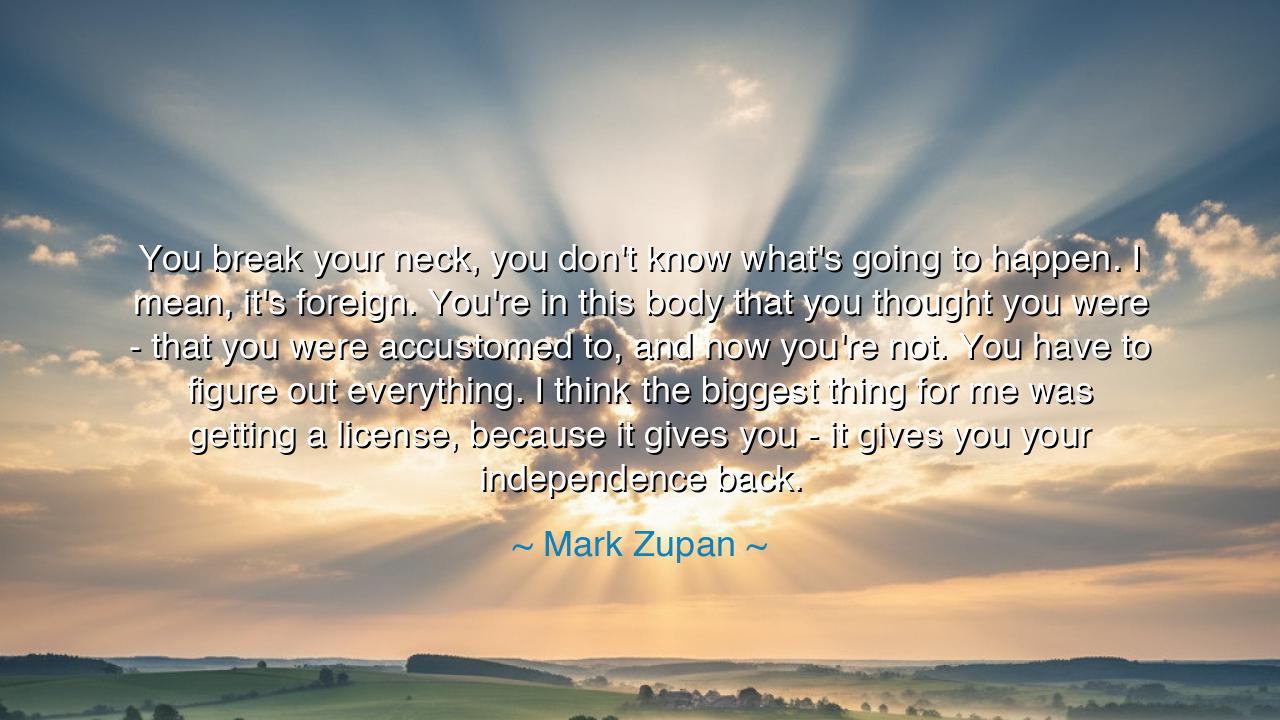
You break your neck, you don't know what's going to happen. I
You break your neck, you don't know what's going to happen. I mean, it's foreign. You're in this body that you thought you were - that you were accustomed to, and now you're not. You have to figure out everything. I think the biggest thing for me was getting a license, because it gives you - it gives you your independence back.






"You break your neck, you don't know what's going to happen. I mean, it's foreign. You're in this body that you thought you were—that you were accustomed to, and now you're not. You have to figure out everything. I think the biggest thing for me was getting a license, because it gives you—it gives you your independence back." – Mark Zupan
Hear these words, O listeners of the soul, for in them speaks Mark Zupan, a man who faced the shattering of his world and yet found within himself the power to rebuild it. His words are not spoken in despair, but in revelation — the revelation that independence, once lost, becomes more precious than gold. When he says that a simple license gave him his freedom back, he is not speaking of mere mobility, but of dignity, of identity, of reclaiming mastery over his own life. For what is freedom, if not the ability to act upon one’s own will — to move, to choose, to live as one’s spirit commands?
The meaning of his words begins in tragedy but blossoms into triumph. Zupan, a renowned wheelchair rugby player, was once like many others — strong, whole, and certain of his body’s obedience. Then came the accident that changed everything, that broke not only his neck but his sense of self. In an instant, he became a stranger to his own flesh, trapped within the same body yet unable to move as before. He speaks of this as something “foreign” — for truly, it is the greatest of human trials to awaken in a life that feels no longer your own. Yet in that foreignness, he discovered a path not of surrender, but of adaptation.
The origin of his reflection lies in his journey from devastation to purpose. After his accident, Zupan could have yielded to despair — as many might, when the body’s strength fails and the mind trembles before the vast unknown. But instead, he chose to learn again, to “figure out everything” as a newborn does: how to move, how to live, how to reclaim joy. The license he speaks of, to drive once more, was not merely a legal document — it was a symbol of his independence restored. To drive was to reclaim direction, to reassert control over destiny. It was the outward proof of an inner victory: that he would not let fate dictate his limits.
This struggle, though born in one man’s life, echoes across the ages. Recall the story of Epictetus, the ancient philosopher who was born a slave and crippled by his master’s cruelty, yet who found in philosophy the key to his own liberation. His body was bound, but his mind was free. He taught that independence is not found in circumstance, but in the mastery of self — that even when the world takes everything from you, your will remains your own. Zupan’s journey is the modern mirror of that timeless truth: the body may falter, but the spirit, if resolute, cannot be subdued.
His words remind us of the sacred bond between independence and identity. When we lose control — of our body, our fate, or our freedom — we risk forgetting who we are. But when we fight to reclaim even a single piece of that control, no matter how small, we restore the dignity of being human. For Zupan, it was a driver’s license. For others, it may be standing unaided, speaking one’s truth, or daring to dream again after loss. Whatever form it takes, the act of reclaiming independence is an act of defiance — a declaration that “I still live, I still choose, I am still me.”
Yet there is another wisdom hidden in his reflection: that independence is never given; it must always be earned, and re-earned. Every soul will face a moment when life demands they begin again — when the familiar self is gone, and a new self must be built from courage and patience. Zupan teaches us that to rebuild is not shameful, but noble; that to learn again what once was simple is not weakness, but rebirth. The greatest heroes are not those who never fall, but those who, having fallen, rise anew — stronger not in body, but in will.
So let this lesson be carved upon the heart of every listener: treasure your independence, but never take it for granted. And if it is lost, do not despair, for it can be reclaimed — not by wishing, but by striving, one small victory at a time. Whatever your struggle, whatever your “brokenness,” remember Zupan’s truth: that the path to freedom begins not with perfection, but with persistence. Independence, once earned through pain and perseverance, becomes more radiant than before, for it is no longer a gift of circumstance, but a triumph of the spirit.






AAdministratorAdministrator
Welcome, honored guests. Please leave a comment, we will respond soon